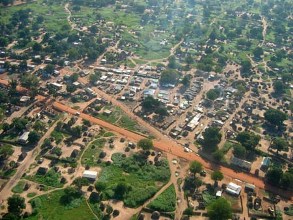Juba is not yet the South Sudan capital – state resolution
By James Gatdet Dak
April 21, 2009 (JUBA) – Central Equatoria state Council of Ministers has expressed reservations about the choice of Juba as the capital of Southern Sudan, adding that this needed wider public consultations.
 In a joint state cabinet meeting with representatives of the Government of Southern Sudan (GoSS), on Tuesday, chaired by the state governor, Major General Clement Wani Konga, the meeting resolved that there was need for consultations with the general public in Southern Sudan in order to select where the future federal capital for the region should be located.
In a joint state cabinet meeting with representatives of the Government of Southern Sudan (GoSS), on Tuesday, chaired by the state governor, Major General Clement Wani Konga, the meeting resolved that there was need for consultations with the general public in Southern Sudan in order to select where the future federal capital for the region should be located.
In the meeting the GoSS Minister for Housing and Physical Planning, Martin Ohuro Okerruk, and his research team, presented and discussed with the state authorities a proposal for the capital city territory Master Plan which was produced after a long time of research by the GoSS Ministry.
The research which was based on geological, technical and political studies selected Juba as a suitable location for the federal capital.
However, Central Equatoria state cabinet expressed reservation to host the capital and resolved that the decision was premature.
It resolved that the decision be delayed until other major towns in the South were improved and that views of the citizens from all the ten states in the region needed to be consulted.
The 2005 Interim Constitution of Southern Sudan stipulates that Juba is the seat for the Government of Southern Sudan.
The Interim Constitution for Central Equatoria state also stipulates that it is its state capital as well as the capital for the Juba County local government.
Juba has been the capital for a number of semi-autonomous governments in the region since 1972, which included the High Executive Council, the Southern Sudan Coordinating Council and now the Government of Southern Sudan.
After the signing of the Comprehensive Peace Agreement (CPA) and formation of the Government of Southern Sudan, based in the town since 2005, misunderstandings between the different levels of the governments over their respective jurisdictions and roles have remained unresolved, causing administrative conflicts.
(ST)
